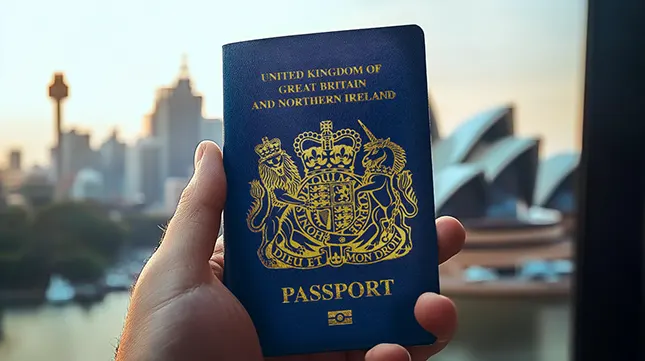Moving to UK from Australia – A Returning Guide

Returning to the UK after years of life down under can feel like a mix of excitement and uncertainty.
For expats coming back from Australia, the UK offers a familiar yet refreshingly diverse landscape, rich in cultural heritage, educational opportunities, and career paths.
Reconnecting with loved ones and old friends, enjoying the ease of shorter travel distances, and perhaps even enjoying the UK seasons are just some of the rewards awaiting those returning home.
Moving back also allows for a rekindling of those quintessentially British experiences, from countryside hikes to cosy pub evenings with old friends.
The transition will most certainly involve adjustments like readapting to the British climate or navigating the unique post-Brexit landscape, but the benefits are plentiful, especially with the support of friends and family and a wealth of resources tailored to returning citizens.
Whether you’re drawn back by a yearning for familiar roots or practical reasons like schooling or job opportunities, the UK promises a welcoming return.
Prepare to enjoy the comforts of home with a fresh perspective, ready to make the most of what the UK has to offer.
In our article, we explore and hopefully address some worries or concerns you might have ahead of your return home.
Start Your Return Home Planning

It is often tricky to know where to start when planning a big move overseas.
Just as you did when you planned to leave the UK for Australia, you need to prepare well in advance for your return.
There may be unavoidable reasons for a quick relocation, such as urgent family matters or work obligations, but generally, the more time you can dedicate to planning, the smoother the process will be.
How straightforward your relocation will be mainly dependant on your personal circumstances.
For instance, if you’ve been in Australia for several years, it takes considerable time to wind up your assets, such as property, a motor car, and any financial commitments, such as Australian credit cards or loans.
To handle both the emotional and practical sides of relocating home after living abroad, it’s essential to create a well-thought-out plan.
This will help you enjoy a meaningful farewell to your host country while ensuring a smooth and organised move back.
Develop a budget and a timeline for your move, ensuring all financial and logistical aspects are covered.
Book your flight and make any required travel arrangements.
Sort through your belongings, deciding what to take back and what to leave behind, keeping in mind UK customs regulations and transport costs.
Look into reputable international moving companies, obtain quotes, and select the one that best meets your needs, then schedule the move.
Dealing with the Culture Shock & Reconnecting

It may take some time to readjust to life in the UK.
It may surprise you to know that many returning from Australia experience varying degrees of culture shock upon their arrival home.
Don’t be too hard on yourself!
Even though the UK may be your home country, it will still take time to re-adjust.
Things may have changed since you were gone. We all like to look back with rose-coloured glasses.
You will also have changed in many ways. Just accept it and take your time.
You may even find that you have little in common with the people you once knew.
Again, this is quite normal. You have experienced a huge adventure, and you are undoubtedly not the same person anymore.
Start by reaching out and inviting some old friends over for a drink and a catch-up or by meeting them for a coffee. Start small and see how it goes.
In most cases, in no time, you will be enjoying their company again, albeit as a different person.
Coming home also offers you a chance to make new friends if things don’t work out.
Slowly, slowly is the order of the day here.
What Visa Do I Need to Come Home?

Make sure you have the right visa for your return to the UK.
For your homeward journey you need to ensure that you have the right visa to be legally able to return.
In most cases, as a British citizen returning to the UK after residing in Australia, you do not require a visa to re-enter and settle in the UK.
Your British passport grants you the right to live and work in the UK without any immigration restrictions.
However, if you have non-British family members accompanying you, they may need to apply for the appropriate visas or permits to reside in the UK.
The specific requirements depend on their nationality and relationship to you.
To understand the necessary steps and documentation, it’s advisable to consult the UK government’s official guidance on family visas.
Additionally, ensure that your British passport is valid for your return journey. If it has expired or is nearing expiration, you should renew it before travelling.
The UK government provides information on passport renewal processes for citizens abroad.
For the most accurate and up-to-date information, refer to the UK government’s official resources on returning to the UK and family visas.
Adapting to the UK’s Cost of Living

There are some clear differences in the cost of living in the UK when compare to Australia.
Expect an adjustment period regarding the cost of living in the UK.
While some aspects may feel familiar, others might surprise you.
Just bear in mind that essentials like groceries, transport, and utilities almost always come at a premium if you move to a major city.
However, overall, the cost of living in the UK is cheaper than in Australia.
Check out this cost-of-living comparison.
Statistics as per numbeo, the cost of living comparison website:
- Cost of Living in Australia is 7.6% higher than in United Kingdom (without rent)
- Cost of Living Including Rent in Australia is 6.7% higher than in United Kingdom
- Rent Prices in Australia are 4.5% higher than in United Kingdom
- Restaurant Prices in Australia are 4.5% lower than in United Kingdom
- Groceries Prices in Australia are 27.7% higher than in United Kingdom
- Local Purchasing Power in Australia is 10.1% higher than in United Kingdom
As you can clearly see, aside from the cost of eating out, the UK is in some cases, significantly cheaper than living down under.
Differences in Property Size and Cost

We are sure you already know, but there are some major differences between properties in the UK and Australia.
You will need to find a place to live, and it is a good idea to get right back into the property market in England.
Having a home base helps to settle you into life back home.
One major disadvantage is that if you buy a property back in the UK, you will have to make allowances for space.
While Australian properties generally come with bigger gardens and larger indoor space, homes in the UK are much smaller.
Depending on how long you have lived in Australia, you will also probably be surprised at how much more expensive the UK property market has become since you left.
The average cost of a home is now £292,924, while Australia’s average is $AUD 973,300 (£496,230).
Over the past five years, UK property prices have experienced notable growth. Here’s a summary of the annual percentage increases:
- 2019: 1.3% increase
- 2020: 7.3% increase
- 2021: 10.8% increase
- 2022: 9.8% increase
- 2023: 1.8% increase
These figures indicate a cumulative rise of approximately 31% from 2019 to 2023.
Stats as per the Office for National Statistics.
Before you move, it’s wise to research housing costs on sites like Rightmove or Zoopla to gain insight into potential locations within your budget.
If purchasing immediately feels daunting, consider short-term rentals to familiarise yourself with the market and explore neighbourhoods.
Renting allows flexibility, giving you time to make an informed decision about your long-term home investment in the UK.
Enrolling Children in UK Schools

Relocating with children can be tricky, so make sure they are signed up for a school back in the UK.
Perhaps you left for Australia and raised a family there and are bringing your children back to the UK.
Here again, things have changed in recent years. You no longer automatically get to attend the school closest to your home.
Thankfully, the vast majority do, but it pays to enrol your child in an excellent local school as soon as possible.
It is a huge step for children of any age. Although the UK and Australian school systems have similarities, there are some notable differences so it will take time for them to adjust.
Encourage participation in extracurricular activities: Clubs, sports, and creative classes are great ways for children to make new friends and settle in.
If your child is aged four or over, contact your local council in England to find out how to apply for a state school place.
In addition, the UK Government website also provides all you need to know about school admissions.
Arranging Access to the NHS

Registering with the NHS may be easier than you think, but make sure you take the time to do so.
Healthcare is often a top concern for those returning to the UK, especially regarding access to the NHS.
This is particularly true if you are returning with children; you never know when you will need a doctor or a hospital.
However, in most cases, you’ll find it reassuringly straightforward.
As long as you can demonstrate that you’re moving back permanently, such as by providing proof of a UK address or residence status, you’ll typically regain access to the NHS services available to all long-term residents.
This means you can register with a GP, access hospital treatments, and receive the same level of care as those who’ve always lived in the UK.
The NHS is designed to support returning residents, making your healthcare transition much smoother than you might expect.
The NHS has a handy “find a GP” in my area page on their website. All you need to do is type in your postcode.
Bringing Home the Pets

There are a number of things to consider if you intend to bring pets back to the UK.
Of course, you will want to ensure your beloved pet comes home, too.
However, several essential steps must be followed to ensure a smooth and safe transition for your furry friend.
Whether your pet originally came with you from the UK or was adopted during your time abroad, the UK has specific regulations for animal entry.
To bring your pet into the UK, it must meet these core requirements:
- Microchipping: Your pet must have a valid microchip that is recognised by UK standards.
- Passport or Health Certificate: A pet passport or an official third-country veterinary certificate is required for entry.
- Rabies Vaccination: Your pet must be vaccinated against rabies, with the vaccination given at least 21 days before travel.
Additional rules apply to certain types of pets, especially for dogs. For instance:
- Tapeworm Treatment: Dogs must undergo tapeworm treatment between 24 and 120 hours (1-5 days) before entering the UK.
For pets that do not meet all requirements, such as missing vaccinations or an unrecognised health certificate, the UK mandates a quarantine period of up to four months at a licensed facility, which can be expensive and distressing for your animal.
It’s advisable to work with a pet relocation service if you need help navigating these regulations, as they can assist in managing the paperwork, health checks, and other logistics, ensuring your pet’s safe and timely return to the UK.
For more detailed guidance on requirements for various types of pets, visit Gov.uk’s pet travel section for updated information.
Getting Your Tax Affairs in Order

Make sure you are on top of all of your taxes to avoid any unwanted fees.
Timing your move back to the UK can simplify your tax responsibilities, especially given the UK tax year runs from April to April.
Moving as close to April 6 as possible can help you avoid filing a ‘split year’ tax return, which many expats find complex.
However, if you need to complete one, a knowledgeable tax adviser can be invaluable in ensuring accuracy and reducing stress.
For guidance, the HMRC website offers resources to clarify tax requirements for returning residents and free support on specific queries.
For more complex tax matters or detailed personal advice, consider consulting a reputable online tax advisor.
Many offer services designed for UK returnees, helping you understand your tax obligations and ensuring a smoother transition.
Make sure that if you choose a financial advisor, they are approved by the IFA.
Financeable has a handy tool.
All you need to do is enter your postcode to find a reputable one in your area.
Getting this part of your journey right is vital to ensure you start your life back in the UK free from any money worries.
Opening a UK Bank Account

Opening a UK bank account, if you no longer have one, is a key consideration.
If you closed all your accounts when you left the UK, you will need to start from scratch here.
Opening a UK bank account before arriving from Australia can be challenging, as most UK banks require proof of a UK address, identification, and sometimes evidence of residency. However, there are options:
- Online and International Accounts: Some UK banks, such as HSBC and Barclays, offer international accounts that can be set up while you’re abroad. These accounts typically cater to expats and may have specific requirements, like minimum deposit amounts or monthly fees.
- Digital Banks: Digital banks, like Monzo, Starling, and Revolut, offer UK-based accounts that can sometimes be opened with less documentation than traditional banks. These banks may allow you to set up an account using your Australian address and switch to a UK address once you move.
- Specialised Expat Services: Banks like Lloyds and NatWest may have expat-specific services that allow for pre-arrival account setup. It’s best to contact the bank directly to confirm their requirements.
Setting up a UK account in advance is an essential process and will mean you have immediate access to funds once you arrive.
A Word About Pensions

Make sure you know what will happen with your pension when moving to the UK.
Among all the other pressing issues, returning to the UK involves careful planning around your pension, whether you have an Australian superannuation fund or a UK pension.
For UK citizens with superannuation savings, options include leaving the fund in Australia, which allows it to grow tax-free, or transferring it to a UK pension scheme if eligible.
However, it’s essential to consider exchange rates, tax implications, and any fees associated with transfers.
If you have a UK pension, resuming contributions and checking your National Insurance record can help ensure you maximise your retirement benefits.
The UK offers voluntary National Insurance contributions, which can help fill any gaps from your time abroad and boost your state pension.
For tailored advice, consider consulting a qualified pension adviser who understands the nuances of both Australian and UK pension systems.
The UK Government’s Pension Advisory Service offers free guidance to help you make informed decisions so that you don’t miss out financially.
When the time comes to finally pack up your belongings, you will need some help.
Shipping Your Effects Home

It is important to understand the shipping process when returning to the UK.
As you did when you sent your personal effects to Australia, they will return via a shipping container.
As long as you have owned and used your household effects for longer than six months, there will be no import tax to pay.
It is a good idea to familiarise yourself with UK customs regulations so that you avoid importing anything unlawful, even if it is by accident.
Shipping from Australia takes time (plus or minus 45 days on the sea).
Then, you must factor in the time each side takes for packing, transporting to the port of exit, customs clearing, and port handling.
The reverse happens in the UK, and then delivery to your new home must be arranged.x
There are many steps to consider, and unfortunately, the whole process can take as long as 10-14 weeks.
As long as you are aware of this, you can plan accordingly.
Making Your Move Home Simple with White & Company

Moving to UK from Australia is a big step, and choosing a trusted international removal company can make all the difference.
White & Company brings well over 150 years of experience in global relocations, ensuring your move is seamless and hassle-free.
With membership in prestigious organisations like BAR, FIDI, and OMNI, White & Company is known for its high standards and dedication to customer satisfaction.
Our skilled teams across the UK are ready to oversee the import and customs clearance of your shipment and arrange delivery to suit you.
We offer storage too if you are not quite ready to receive your belongings. Long- or short-term storage means you don’t have to rush to find a property when you come home.
Your possessions will be safe and secure with us until you are sure about where you will live.
For a smooth start to your UK move, contact White & Company today for a personalised quote or quick chat.
Let us handle the logistics so you can focus on settling back into life in the UK.

Max is a seasoned writer and blogger in the real estate and home moving sectors, as well as a knowledgeable source of information for expatriates living and working abroad. His detailed insights have helped thousands of people move and live abroad with greater simplicity and ease.
Posted in: News
Leave a Comment (0) ↓





